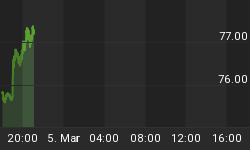Last week, when Congress passed its $787 billion stimulus package, the size of the plan caused many observers to forget the water that has already passed under the bridge. Fewer still are wondering what havoc will erupt when all this liquidity eventually washes ashore.
The latest spending, signed into law yesterday by President Obama, came on top of $300 billion committed to Citigroup, $700 billion for TARP 1, $300 billion for the FHA, $200 billion for TAF and some $300 billion for Fannie and Freddy. Just over the last six months, which excludes the initial Bush stimulus and several massive, unfunded Federal guarantees, nearly $5 trillion has been committed by the government to the financial industry. Rational observers cannot be faulted for concluding, despite Administration claims to the contrary, that the government is merely throwing money at the problem.
Although the rhetoric has managed to convince many observers of the possibility of success, the gold market appears to clearly understand the implications of this unprecedented spending.
The feeling that the government has no idea how to proceed has created palpable panic. In response, pragmatic investors are seeking the ultimate store of wealth. In 2009, as has occurred countless times throughout history, that store will be stocked with gold. Thus, whether the Federal government's interventions will succeed or fail will be anticipated by the price of gold. Right now, the market is screaming failure.
Prior to the latest round of Federal spending, the Federal government had committed $4 trillion to postpone bank collapses and to lay the groundwork for subsequent restructuring. But has any of this activity actually rescued the banking system? In light of the evidence of deepening recession, is it likely that the additional $787 billion in the latest stimulus will instill enough confidence to restore economic growth? If not, what damage will it do to the eventual recovery?
Congressional rescue packages rarely work. Nevertheless, Congress is turning up the heat with previously unimaginable increases of government debt to fund stimulus and rescue packages. Senator McCain rightly describes the scheme as "generational theft". Each package of debt will encumber many future generations, halt restructuring and also threaten latent hyperinflation.
While Congress claims that the seriously over-leveraged economy is in desperate need of restructuring, it appears blind to the fact that deleveraging will encourage such restructuring. Instead, Congressional leaders actively seek to increase leverage and add debt. They warn of fire, while pouring petrol on the flames.
The seriousness of the situation is magnified by the rapidly increasing scale of the problem. Just today, the release of the latest minutes of the Federal Reserve confirmed that even that bastion of eternal optimism is sobering. The American economy, which shrank by 3.8 percent in the last quarter of 2008, is forecast to decline by some 5.5 percent in the first quarter of this year. In some pockets, the unemployment rate is already in double figures. Despite massive Government spending on rescue and stimulus, the American consumer clearly is becoming increasingly nervous, and the credit markets show few signs of recovery.
With bad news only getting worse, investment markets are turning into quagmires. The Dow Jones Average is testing new lows, and the commodities markets show few signs of life. In such times, the price of gold should fall along with the prices of other assets and commodities. But, the reverse has occurred. In the past two months, gold has staged a remarkable rally. This is despite the activity of price-depressants such as official gold sales by the IMF and official 'approval' for massive naked short positions to be opened by new 'bullion' banks.
Not only have gold spot prices risen in the face of such selling pressure, but the price of physical gold is now some $20 to $40 per ounce above spot. This would indicate that investors are now so nervous that they are insisting on taking physical delivery.
Make no mistake, the economy will not turn around soon. When the recovery fails to materialize, look for governments around the world, and especially in the U.S., to send another massive wave of liquidity downriver. When it does, the value of nearly everything, except for gold , will diminish. Don't be intimidated by the recent spike in gold. Buy now while you still can.
For a more in-depth analysis of our financial problems and the inherent dangers they pose for the U.S. economy and U.S. dollar, read Peter Schiff's just released book "The Little Book of Bull Moves in Bear Markets." Click here to order your copy now.
For a look back at how Peter predicted our current problems read the 2007 bestseller "Crash Proof: How to Profit from the Coming Economic Collapse." Click here to order a copy today.
More importantly, don't wait for reality to set in. Protect your wealth and preserve your purchasing power before it's too late. Discover the best way to buy gold at www.goldyoucanfold.com. Download Euro Pacific's free Special Report, "The Powerful Case for Investing in Foreign Securities" at www.researchreportone.com. Subscribe to our free, on-line investment newsletter, "The Global Investor" at http://www.europac.net/newsletter/newsletter.asp.















